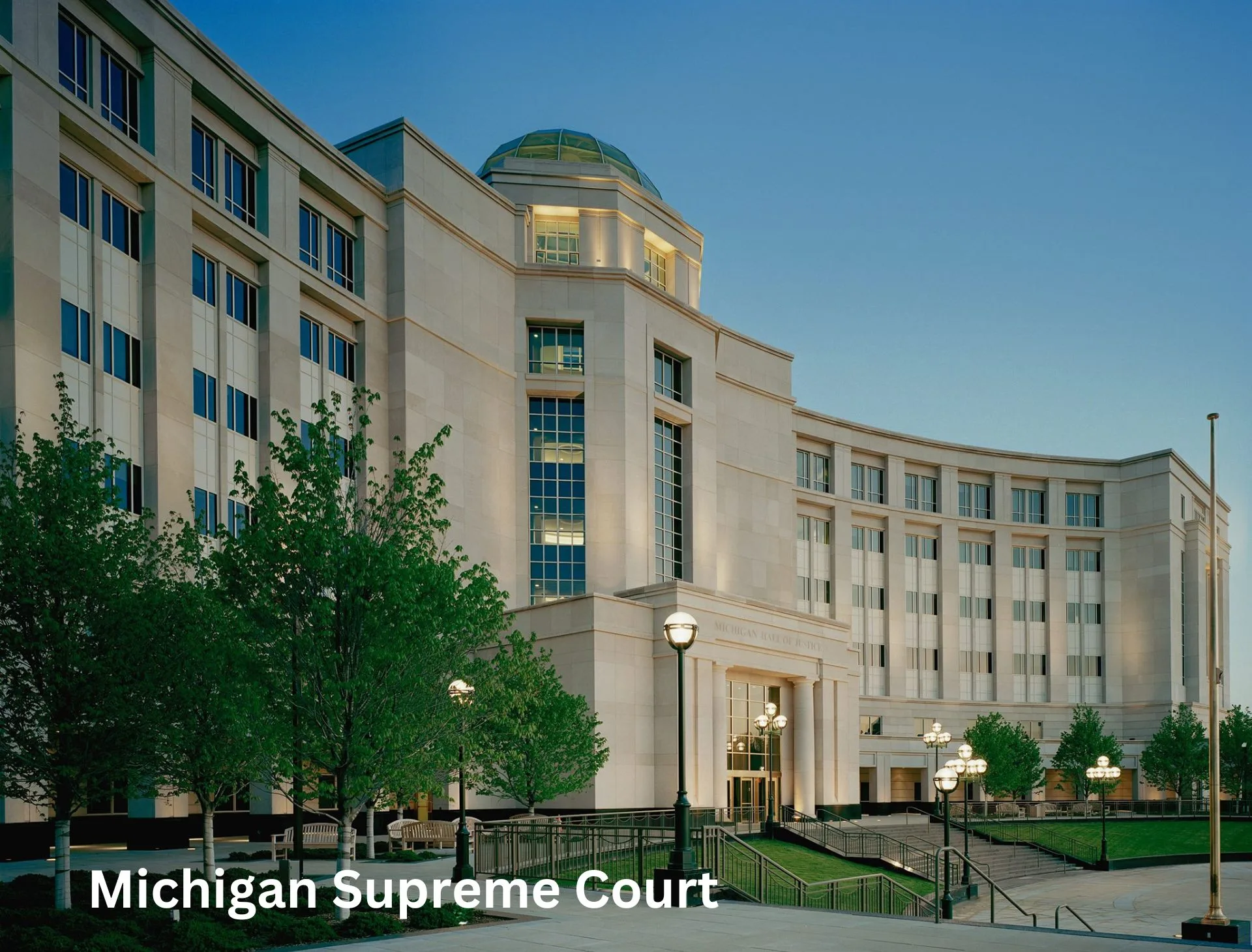The Role and Authority of the Michigan Supreme Court: Safeguarding Justice and the Rule of Law
Michigan Supreme Court – Introduction:

The Michigan Supreme Court, established as the highest judicial authority in the state, plays a pivotal role in shaping and interpreting the law. As a coequal branch of government alongside the executive and legislative branches, the court is vested with substantial authority to ensure justice, uphold the rule of law, and protect the rights of Michigan’s citizens. In this comprehensive 2000-word article, we will delve into the history, structure, functions, and authority of the Michigan Supreme Court.
Historical Overview:
The roots of the Michigan Supreme Court can be traced back to the earliest days of the state’s history. Michigan achieved statehood in 1837, and the establishment of a supreme court was a fundamental step in developing a robust and independent judicial system. Over the years, the court has evolved, adapting to the changing legal landscape while remaining steadfast in its commitment to justice.
Structure of the Michigan Supreme Court:
The Michigan Supreme Court operates within a well-defined structure designed to ensure fairness, impartiality, and efficiency in the administration of justice. The court consists of seven justices, each serving an eight-year term. Michigan’s Constitution provides for the election of justices, fostering a connection between the judiciary and the citizens it serves.
The chief justice, selected by the justices, serves as the administrative head of the court. The justices collectively participate in decision-making, with a majority often required to render a decision. This collaborative approach reflects the court’s commitment to diverse perspectives and the rigorous examination of legal issues.
Functions of the Michigan Supreme Court:
1. **Appellate Jurisdiction:**
The primary function of the Michigan Supreme Court is to serve as the court of last resort in the state’s judiciary. It has appellate jurisdiction, meaning it has the authority to review decisions made by lower courts, including the Michigan Court of Appeals. This power positions the Supreme Court as the ultimate arbiter in legal disputes, ensuring consistency and coherence in the application of the law.
2. **Rule-Making Authority:**
The Michigan Supreme Court possesses rule-making authority, allowing it to establish procedural rules for the state’s courts. These rules govern various aspects of legal proceedings, from civil and criminal cases to evidence and appellate practice. This authority enables the court to shape the procedural framework within which justice is administered, contributing to the efficiency and fairness of the legal system.
3. **Superintending Control:**
The court exercises superintending control over all lower courts in the state. This authority empowers the Michigan Supreme Court to oversee and regulate the practices and procedures of lower courts, ensuring adherence to established rules and promoting a consistent application of the law. Through this supervisory role, the court fosters accountability and maintains the integrity of the judiciary.
4. **Advisory Opinions:**
In certain circumstances, the Michigan Supreme Court may issue advisory opinions on legal questions presented by the governor, the state legislature, or other state officials. While advisory opinions are non-binding, they provide valuable insights into legal interpretations and principles, guiding the actions of public officials.
5. **Judicial Review of Constitutional Issues:**
The court is entrusted with the crucial responsibility of judicial review, especially concerning constitutional matters. It has the authority to interpret the Michigan Constitution, ensuring that laws and government actions align with the state’s foundational legal document. This role underscores the court’s significance in safeguarding constitutional rights and principles.
Authority of the Michigan Supreme Court:
1. **Constitutional Interpretation:**
One of the most significant powers vested in the Michigan Supreme Court is the authority to interpret the state constitution. This includes determining the constitutionality of laws, executive actions, and governmental policies. Through this power, the court acts as a guardian of the constitution, preserving the rights and liberties enshrined in this foundational document.
2. **Precedent Setting:**
The decisions of the Michigan Supreme Court serve as binding precedent for lower courts in the state. As the highest appellate authority, the court’s rulings establish legal principles and interpretations that guide the resolution of subsequent cases. This power to set precedent contributes to the stability and predictability of Michigan’s legal system.
3. **Administrative Rule-Making:**
The court’s rule-making authority extends to the establishment of administrative rules that govern the practice of law in Michigan. These rules cover a broad range of legal procedures and professional conduct, ensuring that the legal community operates within a framework of ethical standards and procedural consistency.
4. **Judicial Discipline:**
The Michigan Supreme Court holds the authority to discipline judges for ethical violations or misconduct. Through established procedures, the court can investigate complaints against judges and, if necessary, impose disciplinary actions ranging from censure to removal from the bench. This authority underscores the court’s commitment to maintaining the highest standards within the judiciary.
5. **Guardian of Individual Rights:**
The court serves as a guardian of individual rights, interpreting laws and constitutional provisions to protect the rights and freedoms of Michigan residents. This includes issues related to civil liberties, criminal justice, and the balance between individual rights and the broader societal interests.
Challenges and Criticisms:
While the Michigan Supreme Court plays a crucial role in upholding justice, it is not immune to challenges and criticisms. Some critics argue that the election of justices introduces political considerations into the judicial process, potentially affecting the perceived independence of the court. Additionally, the court’s workload and the timeliness of decisions have been points of discussion, with calls for measures to enhance efficiency.
Conclusion:
The Michigan Supreme Court stands as a cornerstone of the state’s judicial system, embodying the principles of justice, fairness, and the rule of law. Its authority to interpret the constitution, set legal precedent, and oversee the administration of justice positions the court as a guardian of the rights and liberties of Michigan’s citizens. As the court continues to navigate the complexities of the legal landscape, it remains a vital institution in upholding the principles that form the bedrock of a just and equitable society.